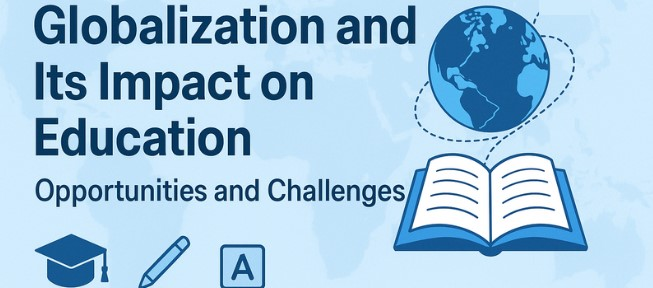Globalization and Its Impact on Education
In the 21st century, the world is more connected than ever before. People, ideas, and technologies move freely across borders, creating what we call globalization. This global interconnectedness has transformed every aspect of life — from business and culture to communication and education.
The impact of globalization on education has been profound. It has expanded access to learning, encouraged cross-cultural exchange, and created new ways of teaching and learning. However, globalization also brings challenges such as inequality, brain drain, and cultural homogenization.
This article explores how globalization influences education, the opportunities it creates, the challenges it poses, and how the future of global education is taking shape.
What Is Globalization?
Globalization refers to the increasing interaction and integration of people, companies, and governments worldwide. It's driven by advancements in technology, communication, trade, and transportation.
In simpler terms, globalization connects the world — making it easier for people to share information, goods, and ideas across countries.
When applied to education, globalization means the spread and exchange of educational ideas, systems, and technologies across borders. It allows students to learn from anywhere, teachers to collaborate globally, and institutions to set international standards.
The Connection Between Globalization and Education
Education is at the heart of globalization. As the world becomes more interconnected, education helps people adapt to global standards, learn new skills, and compete internationally.
At the same time, globalization influences education systems by encouraging:
- International student exchange programs
- Global research collaborations
- Cross-border educational policies
- Online learning and global universities
Simply put, globalization and education feed each other — one drives progress in the other.
Opportunities Created by Globalization in Education
Globalization has opened up new possibilities for students, teachers, and educational institutions. Let's explore the major opportunities it brings.
1. Access to Quality Education Worldwide
In the past, students were limited to local or national institutions. Today, online platforms and international universities make high-quality education accessible to learners everywhere.
- Students can take courses from Harvard, Oxford, or MIT without leaving home.
This accessibility is one of the biggest benefits of globalization.
2. Cross-Cultural Learning
Globalization encourages cultural exchange through international classrooms and exchange programs. Students interact with peers from different countries, gaining a broader worldview and better communication skills.
For example:
- Erasmus+ in Europe promotes student mobility between countries.
- Universities worldwide offer exchange opportunities for cultural exposure.
This helps develop empathy, understanding, and cooperation among future global citizens.
3. Technological Advancement in Education
Globalization has introduced modern technology into classrooms. Smartboards, online resources, virtual reality, and AI-powered learning tools have made education interactive and engaging.
Teachers can collaborate globally, and students can access information instantly — something that was unthinkable decades ago.
4. Standardization of Education Systems
Globalization promotes the standardization of education through international curricula and global benchmarks such as the IB (International Baccalaureate) and Cambridge programs.
This helps students move between countries without facing major academic differences, creating a more unified education system.
5. Global Job Opportunities
With a globalized education system, students develop skills that prepare them for international careers. Fluency in global communication, digital literacy, and intercultural competence are now key to employability.
A degree from a globally recognized university increases career prospects across borders.
6. International Research and Collaboration
Globalization has brought researchers from different parts of the world together. Shared knowledge and joint projects allow scientists, scholars, and institutions to tackle global issues like climate change, pandemics, and poverty.
For instance, global research collaborations between countries helped in the development of COVID-19 vaccines.
7. Economic and Social Development
Global education produces skilled individuals who contribute to economic growth, innovation, and technological progress in their countries. Education also plays a vital role in promoting equality and social mobility worldwide.
Challenges of Globalization in Education
While globalization brings opportunities, it also presents some serious challenges that need attention.
1. Inequality in Access
Not everyone benefits equally from globalization. Students in developing countries may lack access to digital resources, stable internet, or quality institutions. This creates a digital divide that separates privileged learners from the rest.
2. Brain Drain
Talented students and professionals often move from developing countries to developed ones for better education and opportunities. This brain drain weakens local education systems and economies.
3. Cultural Homogenization
Globalization sometimes promotes Western educational models and languages at the cost of local traditions and cultures. As a result, native knowledge systems and regional diversity risk being overlooked.
4. Commercialization of Education
Education has become a global business. Universities compete for international students, often prioritizing profit over quality. Rising tuition fees make global education inaccessible for many.
5. Dependency on Technology
Overreliance on online platforms and technology can lead to reduced human interaction, limited practical learning, and even cyber risks. Not every subject can be effectively taught online.
6. Pressure to Conform
Globalization often pressures educational systems to align with international standards. This can lead to loss of local autonomy and unique learning practices that once defined national education systems.
Balancing Globalization with Local Identity
To make globalization work for education, it's important to balance global knowledge with local identity. Here's how countries can achieve that:
- Integrate local culture into global curriculum
- Include regional history, values, and languages alongside international subjects.
- Promote bilingual education
- Teach students in both their native language and a global language like English.
- Encourage global partnerships
- Develop exchange programs that respect and celebrate diversity.
- Adopt inclusive policies
- Make global education accessible to students from all economic backgrounds.
By doing so, globalization becomes a tool for growth rather than uniformity.
The Role of Technology in Globalized Education
Technology is the driving force behind educational globalization. It enables e-learning, virtual classrooms, and global communication.
Here are some examples of how technology supports global education:
- Online degrees: Students can earn accredited degrees remotely.
- Virtual classrooms: Tools like Zoom, Google Meet, and Microsoft Teams make distance learning easier.
- Open-source learning: Websites like Khan Academy offer free lessons to students worldwide.
- AI-based learning platforms: Personalized lessons adapt to each student's pace and ability.
Technology ensures that education is no longer limited by location, making it a truly global experience.
Impact of Globalization on Teachers
Teachers have also been affected by globalization in several ways:
- They now play the role of facilitators, guiding students to learn independently using technology.
- They can collaborate with educators across the world through online platforms.
- They must continuously upgrade digital and communication skills to meet global teaching standards.
However, teachers also face challenges such as adapting to new technologies and managing diverse classrooms with students from different cultural backgrounds.
The Future of Education in a Globalized World
The future of education lies in global collaboration, technology integration, and sustainable learning.
Here's what's coming next:
- Hybrid Learning: A mix of online and offline teaching methods will become the norm.
- Global Classrooms: Students from different countries learning together in real-time.
- AI Tutors: Personalized learning supported by artificial intelligence.
- Lifelong Learning: Continuous education through online micro-courses.
- Sustainable Education: Emphasis on environmental awareness and global citizenship.
The ultimate goal is to create an education system that's global in access but local in values.
Conclusion
Globalization has changed the face of education forever. It has connected teachers, students, and institutions like never before, offering access to global knowledge and new opportunities.
However, to truly benefit from globalization in education, countries must address its challenges — especially inequality, brain drain, and cultural loss.
The future of learning should embrace diversity while promoting innovation, sustainability, and inclusivity.
In short, globalization and education together have the power to build a smarter, more united world — one where learning truly knows no borders.
FAQs – Globalization and Education
1. What is globalization in education?
It refers to the worldwide integration of educational ideas, systems, and technologies, enabling global access to learning and collaboration.
2. How does globalization benefit education?
It improves access to quality education, encourages cultural exchange, supports technological growth, and prepares students for global careers.
3. What are the challenges of globalization in education?
Challenges include inequality, cultural loss, brain drain, and commercialization of education.
4. How has technology supported globalization in education?
Technology enables e-learning, online collaboration, virtual classrooms, and global communication between students and teachers.
5. What is the future of global education?
It will focus on hybrid learning, AI-based education, sustainability, and global partnerships to ensure equal learning opportunities for all.
UPSC




























































 Copy Link
Copy Link



























